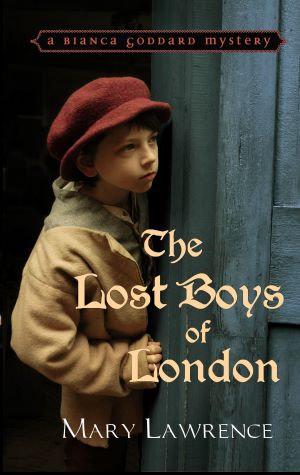I was given an ARC of Mary Lawrence’s The Lost Boys of London by the author herself – thanks, Mary! This novel is the fifth and final novel in the Bianca Goddard mystery series. It comes out on April 28, which means that you all are less than a month away from reading this well-written mystery. It was understandable and easy to read as a standalone novel, but some hints to Bianca’s previous adventures made me wonder what else she’d been up to. If you want to find out, Lawrence’s website is www.MaryLawrenceBooks.com. There are also links on the website for purchasing this novel and its predecessors; they are all available in ebook format as well as print.
In this novel, Bianca assists egotistical Constable Patch in solving the murder of a boy found hanging from a church. They conclude that there’s no way that the boy could have hung himself as there’s an unusually peaceful expression on his face. When a second boy is found in the same manner, and Bianca’s friend and helper Fisk goes missing, she becomes even more deeply involved in the investigation. With her husband away fighting for the king, the recent loss of her baby, and her worry over Fisk, Bianca relies on her friends for support in solving this mystery.
This novel takes place in roughly 1545 in the Tudor period of England, which is a couple of hundred years later than the Owen Archer medieval series that I’ve reviewed. However, I can’t help but draw similarities between the two series as the settings and attitudes are fairly similar. Both Bianca and Owen and his wife are apothecaries, and use their skills to their advantage when investigating. Both feel like outsiders as Owen literally is one, while Bianca has a reputation that she must be mindful of.
Despite the similarities in their backgrounds, following Bianca has a totally different feel than following Owen. Owen’s mysteries are more political in nature, while Bianca is called to investigate the issues and intrigue of more common people that Owen’s leaders might not bother involving themselves with. Bianca doesn’t get to interact with noblemen as Owen does, so we see her having a harder time asking questions as an ordinary citizen. Bianca is also a touch more gentle than Owen in her approach, although she’s as tough as nails in her personality and inner strength.
I enjoyed reading this novel. It had a solid plot, reasonable characters, and it was pieced together really well. Lawrence does a really good job of third-person omniscient writing, and gives readers peeks into each character’s thoughts and actions outside of the main focus of Bianca. The pieces are intriguing and definitely want to make a reader keep pursuing the story. In terms of language, it was exceptional. The descriptions used are concise; they convey exactly what readers are supposed to understand without wasting words and pages to do so. If you want an example, check out the whopper of this sentence:
“The warren of tightly packed residences, ordinaries, mercers, stationers, chandlers, and cordwainers sat in unremitting penitence near the ominous cathedral, and never was their compunction more intensely felt than during the bleak days of this midwinter.”
If she’d wanted to, Lawrence could have easily stretched that sentence to a paragraph or two to describe the cold, dark days of the winter in London. But, that sentence says it all, and with great purpose and word choice. I would recommend this book to anyone looking for a good mystery – but you may also want to start with the first book, The Alchemist’s Daughter, if you like reading a series in order. I found the characters in this novel well-rounded and amusing, the mystery intriguing, and the setting described so that I could picture it in my head. I look forward to what Lawrence may write next!
